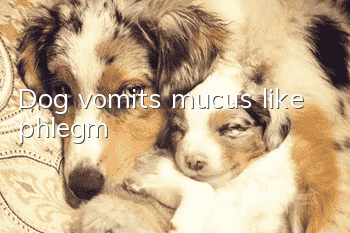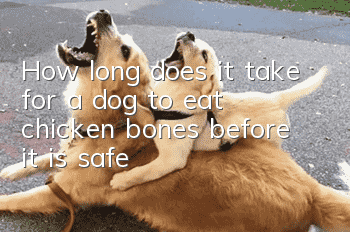What to do about dogs’ gastrointestinal problems? What’s the most effective way to treat them?

What to do about dogs’ gastrointestinal problems? What is the most effective way to treat them? People will get sick if they eat whole grains. Dogs, like people, are omnivores and will naturally get sick. So the most talked about thing is dog gastrointestinal diseases. There are many types of gastroenteritis in dogs. Today, let’s learn about the types of gastroenteritis in dogs.
What should I do if my dog has gastrointestinal problems? How to adjust? Enteritis refers to acute or chronic inflammatory disease of the intestinal mucosa. Enteritis can occur as a separate disease affecting only the small intestine, but more commonly it is widespread inflammation of the stomach, small intestine, and colon. Enteritis is a general term that includes inflammation of the stomach, small intestine and colon.
Cause: The cause of enteritis is roughly the same as that of gastritis, but this disease is usually secondary to certain infectious diseases, parasitic diseases, and toxic diseases. Such as: canine distemper, parvovirus, coronavirus, tapeworm, roundworm, hookworm, whipworm, trichomonas, organophosphorus poisoning and other pesticide poisoning. In addition, pathogenic bacteria can also cause enteritis. For example: Escherichia coli, salmonella, Proteus, etc. can cause enteritis. At the beginning of the disease, intestinal catarrhal symptoms often appear, with mucus and soft stools in the stool. When inflammation spreads to the submucosal tissue, the stool will be watery and smelly. When there is inflammation in the duodenum, vomiting symptoms may occur. When the intestinal mucosa is damaged and bleeding, the feces will be tomato paste color with a fishy smell, tenesmus, and anal incontinence in severe dogs. Severe changes in the whole body include depression, slow reaction, general weakness, body temperature rising above 40-41°C, tachycardia, visible mucosal cyanosis, sunken eyeballs, high degree of dehydration, and acidosis. Severe cases may cause coma or death from self-poisoning.
Do not let diseases enter through the mouth Don’t eat randomly
What should I do if my dog has gastrointestinal problems? How to adjust? Since the disease enters through the mouth, drug treatment only treats the symptoms but not the root cause. If you want your dog’s stomach to suffer less, you should adjust your eating habits, avoid frequent food changes, and feed your dog reasonably. At the same time, in order to avoid food allergies, dogs should eat less shellfish, meat, high-fat, offal and seafood foods. To adjust your eating habits, you must first change the type of food. The food should be fresh, easy to digest and absorb, and can also be based on dog food with rich nutritional ingredients. Don’t feed your dog harsh, hard foods. Feed small and frequent meals every day to avoid adding burden to the dog’s gastrointestinal tract. When replacing food, you need to slowly add and replace it. Generally speaking, a one-week replacement period is better, that is, slowly add new food until one week later, completely replace it with the new food. Common drugs for treating gastrointestinal discomfort in dogs include probiotics, etc. Probiotics are an essential factor for pet gastrointestinal health and even body health. Supplementing pets with probiotics every day can maintain the health of the gastrointestinal tract. Probiotics are basically powdered medicines that can be licked by pets or dissolved in water for drinking, or mixed into food for feeding. Generally, the dog's condition will improve after taking probiotics.
What should I do if my dog has gastrointestinal problems? How to adjust? Generally speaking, when dogs have gastrointestinal discomfort, they willSymptoms such as vomiting and diarrhea, gastrointestinal digestive disorders, picky eaters or anorexia, or digestive system disorders may occur. In these situations, it is necessary to feed the dog Guden probiotics in time to solve the problem. If the breeder does not provide effective treatment to the dog in time. A dog's gastrointestinal discomfort can develop into a serious intestinal disease. At that time, the dog will become thinner and less likely to eat. When the disease is serious, the dog will have diarrhea, which seriously threatens the dog's life and safety.
- Can dogs eat sweet potatoes?
- Never give your dog a bath under these circumstances
- golden retriever pregnancy process
- What should I do if my dog doesn’t eat the new dog food?
- How to train an aggressive dog? Train a very aggressive dog!
- What should I do if my dog has dystocia? A must-read for emergency measures for dog dystocia!
- What are the symptoms of canine distemper in dogs? The early symptoms of canine distemper!
- Symptoms and treatment methods of epilepsy in dogs
- Do dog owners need to be vaccinated?
- The Origin and History of the Australian Cattle Dog



